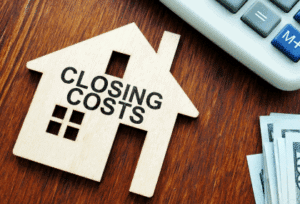Understanding Seller Closing Costs In Tampa Real Estate
Discover the essential details about seller closing costs in Tampa’s real estate market. Learn what expenses to anticipate, how they impact your sale, and tips for a smoother transaction.
Please enter your username or email address. You will receive a link to create a new password via email.
Discover the essential details about seller closing costs in Tampa’s real estate market. Learn what expenses to anticipate, how they impact your sale, and tips for a smoother transaction.

Knowing seller closing fees before selling your Tampa home helps you manage your money. You should know about the different expenditures and fees that will affect how much you make when selling your Tampa home. Seller closing costs may include real estate agent fees, which are usually high, title insurance, transfer taxes, and property taxes. Sellers may have to pay for repairs or renovations to make the home more desirable to buyers. They may also have to compromise to smooth negotiations. You must prepay these fees to have enough money to complete the purchase. Recognizing these financial requirements ahead of time will help sellers navigate the Tampa real estate market and maximize their house sale.
When selling a house in Tampa, Florida, you must know the closing fees. Sellers should be aware that closing costs may vary. Title insurance and escrow fees, which track money during the sale, are regular charges. Sellers may also be responsible for property taxes and utility payments until closing.
Real estate commissions are another big charge. They often take 5–6% of the home’s sale price. Property inspectors may find repairs or buyer incentives, so sellers in Tampa’s competitive market should consider their costs. These charges help sellers calculate their earning from selling their home in Tampa’s ever-changing real estate market. If you’re concerned about reducing expenses, working with a cash home buyer in Tampa can help. Many cash buyers streamline the sale, eliminate extra fees, and sometimes absorb the closing costs themselves. Contact Home Options.us for more Details.
Both buyers and sellers of Tampa homes must know the closing expenses. The seller’s closing fees are normally required to complete the sale. This includes title insurance premiums, which safeguard against ownership disputes, and real estate agent commissions, which are frequently the highest prices. Sellers may also owe pre-transaction property taxes and homeowner association fees.
Appraisal, loan origination, and inspection costs are often charged to buyers. Buyers usually cover property insurance and mortgage costs. Tampa sellers can help buyers pay certain closing costs by communicating to them to streamline the process. Knowing these financial tasks helps sellers estimate their earnings and prepare for the fees that come with buying a difficult residence.
Both buyers and sellers of Tampa homes must know who pays the closing costs. In real estate sales, the buyer and seller split closing fees, however local customs may differ. Florida sellers often cover title insurance and deed preparation. Sellers may also pay real estate agency fees, which make up a major portion of closing costs.
Other payments, such property taxes or homeowners association dues, may be separated by transaction date. Sellers must read the purchase agreement to know what they are financially responsible for, as buyers usually pay for lending costs and appraisals. Tampa merchants can better conduct business and follow local laws if they know these things.

Most counties, including Hillsborough County, with Tampa, charge 70 cents every $100 of the sale price. In some circumstances, sellers must pay prorated property taxes until closing to ensure they pay their fair share of the annual amount. Miscellaneous expenditures may include attorney or notary fees, filing fees, or escrow services if needed to close the deal. Knowing these charges helps sellers plan for a successful real estate sale in Tampa’s fast-paced market.
Florida, especially Tampa, sellers often have to pay many closing charges that can affect their real estate profits. Florida house sellers must pay closing fees of 6%–10% of the sale price. Real estate agent commissions, which average 5% to 6%, are crucial. Sellers must also pay title insurance to cover title issues. This typically costs about 1%–5% of sale price. Another regular cost is the deed documentation stamp tax. Based on $ In most jurisdictions, including Hillsborough County, where Tampa sits, the charge is 70 cents per $100 sold. If sellers offer to pay property taxes and house warranty charges to attract purchasers, they may have to. These common charges are necessary to calculate how much you’ll profit selling property in Tampa’s fast-paced real estate market.
Several factors affect seller closing costs in Tampa real estate. These can greatly affect a house seller’s profit. An important consideration is the real estate commission. The buyer’s and seller’s agents frequently negotiate a large portion of the closing fees. Title insurance fees must be considered by Tampa sellers. Buyers and lenders usually require these title insurance payments. Property taxes are crucial. Sellers frequently pay prorated taxes until closing. All property liens and mortgages must be paid at closing. The final cost may also depend on attorney fees, recording fees, and repair credits. In Tampa’s fast-paced real estate market, these facts might prepare sellers for financial duties during the transaction.
Sellers’ closing estimates in Tampa vary depending on market conditions. In a competitive market with many buyers but few properties for sale, sellers may save on closing fees. Sellers may need to spend greater closing costs to attract purchasers in a buyer’s market. Interest rates and local property market changes are also important economic drivers.
Buyers may lose interest as rates rise. This may require sellers to spend more to close a sale. Local events like new developments or employment market shifts may also effect sellers’ closing cost negotiations. If Tampa sellers know these trends, they can negotiate better. Based on market conditions, this helps them set realistic targets.
Knowing what makes Tampa’s real estate market unique is important when comparing seller closing costs across Florida. Sellers in Tampa often pay transfer taxes, title insurance, and escrow fees. These prices can vary greatly from Orlando or Miami. If the government sets criteria that make the average title insurance rate the same across the state, local taxes and city levies might make the cost vary. In Miami, higher property values mean higher commissions. These percentages may be lower in smaller areas like Tallahassee or Gainesville, but county-specific assessments or lien searches may cost more. Sellers in Florida’s diverse real estate market must understand these differences to anticipate closing costs.
Tampa home sellers can save a lot by communicating closing expenses well. Title insurance, escrow fees, and transfer taxes are common expenses that homeowners should be aware of to save money on house sales. Sellers in Tampa should know that buyers cover closing expenses. Some of these fees may be negotiated back to the seller. Sellers should research local conditions and use previous sales data from similar properties to negotiate strongly.
Offering buyer incentives like closing cost assistance can make a home more appealing without lowering the price. A Tampa-savvy real estate company can help you share expenditures and find savings. By being aware and ready to negotiate, Tampa sellers can get attractive deals that make money and cut costs. While calculating your potential closing costs, it’s equally important to know how to protect yourself from pushy or unsolicited home buying offers. Our guide How To Stop Unsolicited Home Buying Offers In Tampa’s Real Estate Market explains practical steps you can take

An offer that is somewhat below the asking price but asks the seller to cover closing costs may still meet the seller’s financial goals. Sellers can determine whether to pay these fees to maximize their investment and ensure a smooth transaction by analyzing local market trends and consulting a knowledgeable real estate agent. Consider how paying the buyer’s closing fees in Tampa real estate transactions may affect your profits before making the decision.
Buyers of Tampa properties must understand how seller payments to closing expenses affect their agreement. The seller usually pays closing charges such title insurance, property taxes, and real estate agent commissions. Sellers may pay some closing costs to ease the deal. Buyers looking to reduce closing costs may benefit from this.
These contributions can vary depending on the contract and the Tampa home market, so you should understand them. Seller donations can help buyers with money issues in the short term, but they may affect the sale price or other contract terms. Buyers can make better bids if they know sellers’ compromises. This may make Tampa homebuying easier.
Tampa property sellers must understand how seller-paid closing expenses influence them legally and financially. Tampa sellers may pay title insurance, escrow fees, and transfer taxes. These costs can significantly lower a seller’s sale proceeds, which may affect their money management. Local restrictions on these fees and purchase agreement responsibilities must be known by sellers.
In Florida, the seller usually pays closing fees, however this can vary by buyer and seller. Offering to pay for extra closing fees may make your house more enticing to purchasers, but it may reduce your sale price. Sellers in Tampa’s competitive real estate market should consult real estate agents or lawyers to understand how legal and financial issues influence them.
When selling a Tampa home, title insurance is essential. This insurance protects against post-sale title difficulties. It protects both sides and streamlines the deal. Then selling their property, title insurance gives them piece of mind by preventing unexpected claims or disputes over property rights. Title insurance is critical in Tampa’s fast-paced real estate market, where properties have complex histories. It protects the buyer and seller from legal complications caused by the prior owner. Title insurance shows sellers are honest and desire a smooth closing. The business community trusts each other more.

When selling a Tampa home, you should know the closing fees. The seller’s closing costs could greatly affect their sale profit. Tampa real estate sellers may pay title insurance, escrow fees, and transfer taxes. But it’s important to examine how much the seller can help with closing costs. In Tampa, where there are many purchasers, sellers could pay part of these costs to attract buyers.
The seller’s closing expense contribution relies on the buyer’s loan and market conditions. With an FHA loan, sellers can contribute up to 6% of the purchase price to closing costs. In Tampa’s fast-moving real estate market, sellers should consult with their realtor and maybe a lawyer to understand seller concession charges and legal constraints. Although Tampa real estate agreements have distinct limits and buyer expectations, sellers can arrange their house sale to maximize profits by knowing these items.
To budget for a Tampa home purchase or sale, you must know seller closing fees. Tampa sellers often pay 6% to 10% of the home’s sale price for closing expenses. These expenditures may include the real estate agent’s commission (5%–6%), title insurance, recording, property taxes, and any negotiated repairs. Depending on Tampa location, sellers may pay prorated homeowners association dues or transfer taxes. Sellers should save enough money and consult a real estate agent to understand all sale expenses. Tampa real estate sellers can avoid surprises and streamline the closing process by knowing closing fees.
When buying a $300,000 Tampa home, buyers and sellers must know seller closing costs. Sellers in Florida pay 5%–10% of the home’s sale price for closing expenses. If the property is worth $300,000, sellers should expect closing fees of $15,000–$30,000. Real estate agents charge 6% of the sale price, or $18,000 on a $300,000 home.
Title insurance, recording fees, and unpaid property taxes may incur extra charges. Sellers should also know that purchasers may request repair credits or other concessions after inspection. These closing fees are unique to the Tampa real estate market, so sellers may plan better and receive a better deal.

| BANKRATE.COM | BANKRATE | HOMEBUYERS | REALTORS | TITLE COMPANY | TITLE COMPANIES |
| MORTGAGE LENDER | MONEY | LOAN APPLICATION | PAYMENT | INFORMATION | PROPERTY VALUATION |
| MEDIAN HOME PRICE | HOMEOWNERS INSURANCE | ESCROW ACCOUNT | DOWN PAYMENT | POLICY | TITLE SEARCH |
| TITLE SEARCHES | FIRST LIEN | HOA | HOMEOWNERS ASSOCIATION (HOA) | HOME EQUITY | EQUITY |
| LEGAL OWNERSHIP | PROPERTY OWNERSHIP | THE NATIONAL ASSOCIATION OF REALTORS | NAR | FINANCE | CREDIT CHECK |
| CREDIT SCORE | CREDIT REPORT | BLOG | TAX RATE | INSURANCE POLICY | HOME EQUITY LOANS |
| MORTGAGE POINTS | CREDIT CARD | OWNERS TITLE INSURANCE | HOMES SALE PRICE | REAL ESTATE AGENTS | THE BUYERS AGENT |
| CLOSING COSTS AND | OF THE BUYERS | CLOSING COSTS FOR | PAYS CLOSING COSTS | THE DOWN PAYMENT | THE HOMES SALE PRICE |
| OF THE BUYERS CLOSING | PAYS CLOSING COSTS IN | WHO PAYS CLOSING COSTS | CLOSING COSTS CLOSING COSTS |
![Cash House Buyer in [market_city]](https://homeoptions.us/wp-content/uploads/2025/07/Justing-Setzer.png)
Justin Setzer is a seasoned real estate investor and the founder of Home Options Group, a company that buys houses for cash in Tampa, Florida, and throughout the state. He specializes in helping homeowners sell quickly—whether due to foreclosure, inheritance, or other urgent situations—by providing fair, no-obligation cash offers and flexible closings. With a deep understanding of the Tampa real estate market, Justin is committed to making the home-selling process simple, stress-free, and pressure-free.